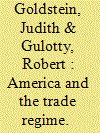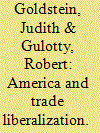| Srl | Item |
| 1 |
ID:
178571


|
|
|
|
|
| Summary/Abstract |
The era of American leadership in the multilateral trading regime has ended. This paper argues that this current antipathy to trade is unsurprising: support for US leadership of the regime has always rested on a precarious balance among domestic interests. To overcome a historic bias in favor of home market production, American leaders created incentives for exporters to organize while creating roadblocks for import-competing firms and their employees. The dominance of the exporters’ voice had a significant influence on the policies the US pursued in the design and execution of the global trade regime. Most importantly, the absence of labor's voice undermined the prospect for “embedded liberalism” and instead resulted in an anemic system of adjustment for job loss at home and limited support for worker interests within the regime. While policymakers’ decision to shift power away from potential “veto” groups may have been necessary for US leadership of the Liberal International Order, this institutional design undermined a robust response to the economic dislocation thought to be a result of globalization. The result was a fracturing of the coalition in support of American leadership in the GATT/WTO regime.
|
|
|
|
|
|
|
|
|
|
|
|
|
|
|
|
| 2 |
ID:
131492


|
|
|
|
|
| Publication |
2014.
|
| Summary/Abstract |
Among scholars, delegation of power to the US president in 1934 is widely believed to have been a necessary requisite for tariff reductions in ensuing years. According to conventional wisdom, delegation to the president sheltered Congress from constituent pressure thereby facilitating the opening of the US economy and the emergence of the United States as a world power. This article suggests a revision to our understanding of just how that occurred. Through a close study of the US tariff schedule between 1928 and 1964, focusing on highly protected products, we examine which products were subject to liberalization and at what time. After 1934, delegation led to a change in trade policy, not because Congress gave up their constitutional prerogative in this domain but because presidents were able to target the potential economic dislocation that derives from import competition to avoid the creation of a congressional majority willing to halt the trade agreements program.
|
|
|
|
|
|
|
|
|
|
|
|
|
|
|
|
| 3 |
ID:
183776


|
|
|
|
|
| Summary/Abstract |
Foundational theories of trade politics emphasize a conflict between consumer welfare and protectionist lobbies. But these theories ignore other powerful lobbies that also shape trade policy. We propose a theory of trade distortion arising from conflict between consumer welfare and importer lobbies. We estimate the key parameter of the model—the government's weight on welfare—using original data from Venezuela, where Hugo Chávez used an exchange-rate subsidy to underwrite hundreds of billions of dollars of imports. Whereas estimates from traditional models would make Chávez look like a welfare maximizer, our results indicate that he implemented distortionary commercial policy to the benefit of special interests. Our analysis underscores the importance of tailoring workhorse models to account for differences in interest group configuration. The politics of trade policy is not reducible to the politics of protectionism.
|
|
|
|
|
|
|
|
|
|
|
|
|
|
|
|